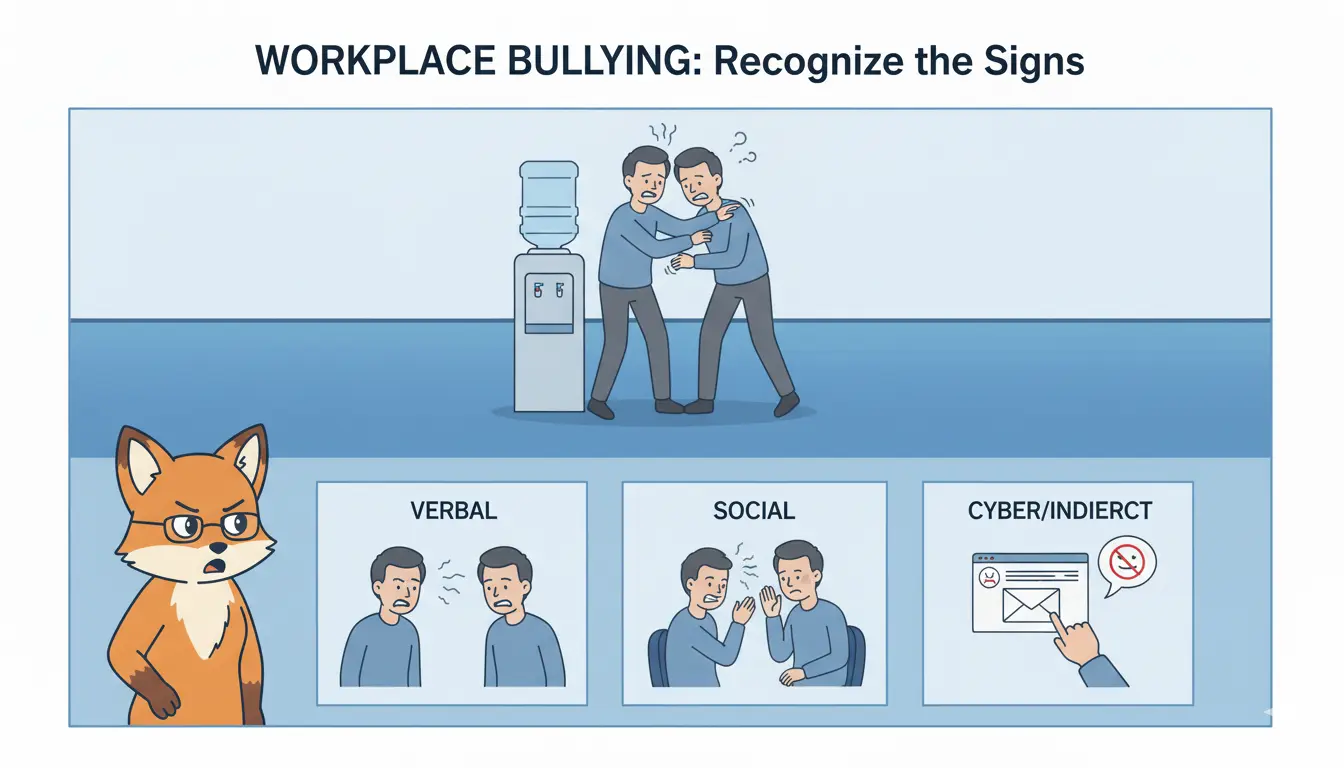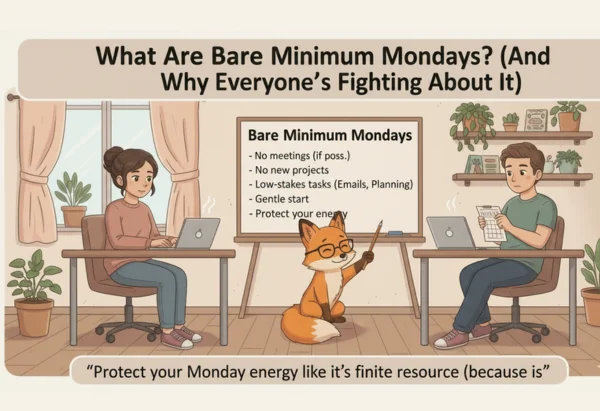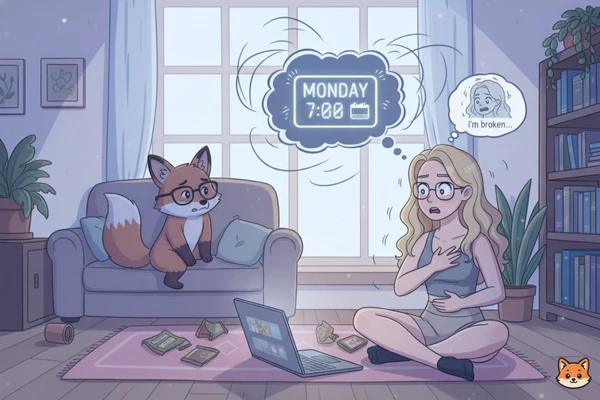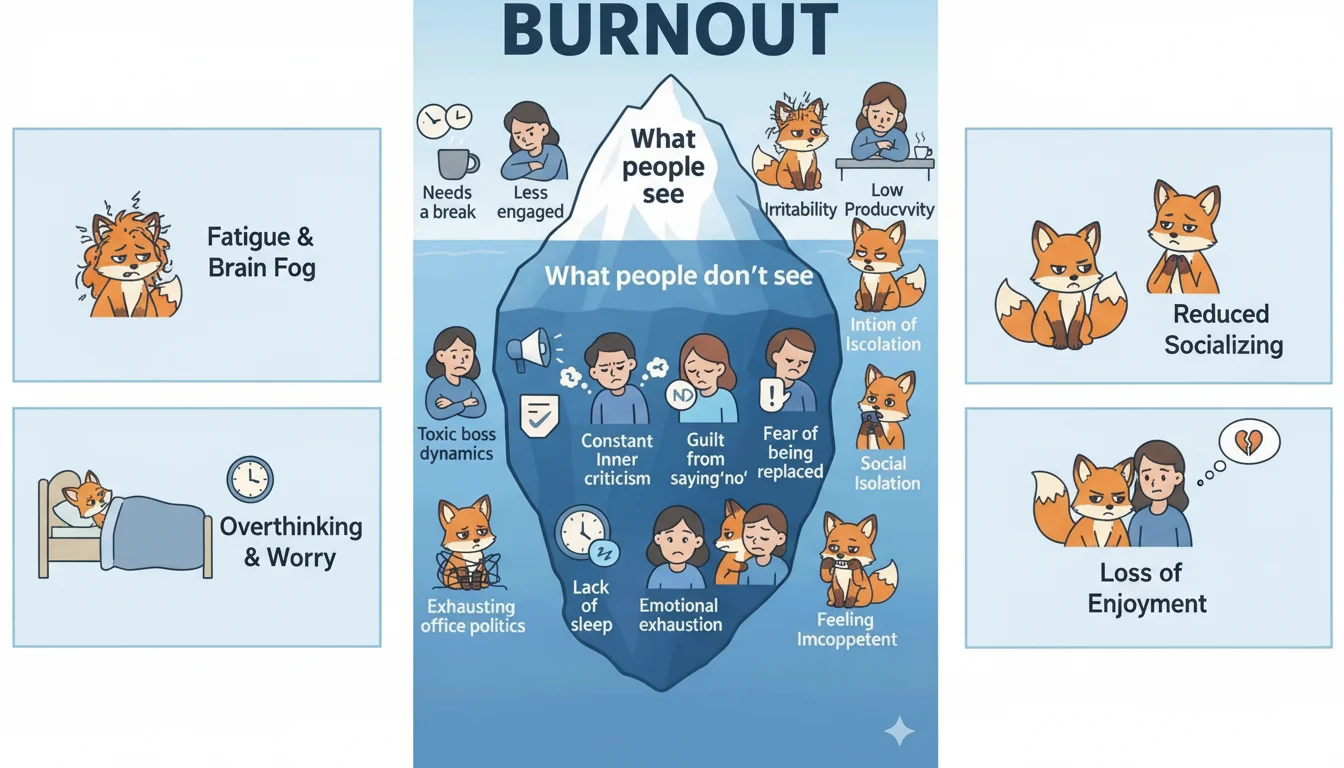
Why I'm Finally Telling My Workplace Bullying Story (And Why It Might Save You)
For five years, I kept quiet. Not from shame, but fear. Today I'm breaking my silence about workplace bullying, PTSD, and the hidden career penalty survivors face—because someone needs to hold the umbrella until you can step out of the rain.
The Story I've Kept Quiet for Six Years
Hi, it's Sisi here. 🦊
I want to tell you something I've never shared publicly before.
For six years, every time I tried to write this, my chest would tighten. My hands would shake. The words would get stuck in my throat like they were too heavy to lift.
Not because I was ashamed.
But because speaking up felt dangerous—like opening a door I'd worked so hard to close.
Today, I'm opening that door. And if you're reading this because you're hurting too, I want you to know three things:
-
You're not alone. According to the 2024 Lloyd's Register Foundation World Risk Poll, 47.9% of Australians—nearly 1 in 2—will experience workplace harassment in their lifetime. Australia is ranked #1 worst globally.
-
You're not crazy. What's happening to you is real, documented, and not your fault.
-
You will survive this. I know because I did. And I'm here to show you how.
Why I'm Sharing This Now
Maybe you're reading this at 2am because you can't sleep.
Maybe you googled "is it normal to cry before work every day."
Maybe you're wondering if you're just "too sensitive" or "can't handle pressure."
I see you. I was you.
And I stayed silent for five years because:
- I was terrified of being sued
- I worried no one would believe me
- I thought maybe it really was my fault
- I was exhausted from just surviving
But then I realized: every person who stays silent allows the cycle to continue.
New people join these organizations excited about their careers. They have no idea what they're walking into.
No one warned them. No one spoke up. No one said, "This culture will break you."
I'm breaking that silence today.
Part 1: "You Have No Ability"
Let me take you back to a Tuesday morning, 8:47am.
I'd been a Manager for 8 years. Twenty years in my professional roles. I loved my work. I believed in our mission.
Then I got called into my new manager's office.
She slammed my job description on the table. And said—not once, but over and over, in a voice loud enough for others to hear through the door:
"You have no ability."
Not: "This report needs improvement." Not: "Let's discuss your performance."
"You. Have. No. Ability."
I stood there and froze. Completely froze.
Not metaphorically—my body literally shut down. I couldn't speak. I couldn't defend myself. I couldn't even cry until hours later, alone in my car.
That's when I learned something important: trauma response isn't just "fight or flight." It's fight, flight, freeze, or fawn.
I froze. And then I spent months fawning—desperately trying to please, to prove, to be good enough.
It didn't matter. Nothing was ever enough.
The Signs I Missed (That You Might Be Missing Too)
Looking back, the warning signs started much earlier. But I explained them away:
🚩 Constantly changing requirements "She just wants excellence. I need to work harder."
🚩 Excessive micromanagement "She's detail-oriented. I should be more organized."
🚩 Public criticism, private praise (if any) "She's tough but fair. This is just professional feedback."
🚩 Isolating me from team activities "I'm probably being paranoid. Everyone's just busy."
🚩 Weaponizing HR policies against me "I must have done something wrong. The policies are there for a reason."
Sound familiar?
Here's what I wish someone had told me then:
When your gut screams "something is wrong" but your brain says "you're overreacting"—trust your gut. Your body knows what your mind can't admit yet: this place is not safe.
Part 2: The Day Laughter Became a Liability
One afternoon, my team and I shared a laugh. Just once. About something completely trivial.
A rare moment of joy in an increasingly oppressive environment.
She saw it from her office.
Minutes later, I was called in:
"Your team is toxic."
That's when I knew. Joy had become evidence of poor management. Laughter was now a liability.
I started telling my team to keep their heads down. To look busy even when they'd finished their work. To be quiet, invisible, safe.
I became complicit in our own oppression.
And that's when the real shame set in—not from being bullied, but from becoming part of the system that enabled it, just to survive.
Part 3: When Even the Mental Health Counselor Couldn't Survive
Here's the part that still haunts me.
I thought I was weak. I thought, "I have 20 years of experience—I should be tougher than this."
But then I watched what happened to others in that organization.
There was a workplace mental health counselor—someone literally trained to provide pastoral care, to support people through emotional and spiritual crises.
They were bullied out.
There was a psychologist—a licensed mental health professional who helped others manage trauma for a living.
They couldn't survive either.
When I tried to reach out to them for help, there was no response. Later I heard they were experiencing the same treatment—or worse.
That's when it clicked:
This wasn't about me being weak. This was about a culture so toxic it destroyed everyone—regardless of their training, experience, or emotional capacity.
If people whose entire profession is emotional resilience can't survive your workplace culture, the problem isn't the people.
The problem is the culture.
Part 4: The PIP Weapon (Or: When 50% of Your Team Is "Underperforming")
For six months, she dangled a Performance Improvement Plan over my head like a guillotine.
"I'm preparing it." "You'll see it soon." "It's coming."
Every day, I walked into work wondering if today was the day.
The anticipation was worse than the actual PIP when it finally arrived.
But here's what really broke me:
Over half of staffs was on PIPs at the same time.
Think about that for a moment.
If more than 50% of your workforce is simultaneously on "performance improvement" plans... is that a performance problem?
Or is that systematic psychological warfare?
I watched confident, competent professionals—people with years of experience, strong track records, industry expertise—get systematically broken down.
They'd say things like:
- "Maybe I'm just not good at anything"
- "I don't know why I ever thought I could do this job"
- "I'm probably not cut out for this industry"
And many left the industry entirely. Talented people. Years of specialized experience. Genuine passion for the work.
Gone.
Part 5: The PTSD I Didn't Know I Had
Fast forward five years.
I'm in a café. I see someone with my former manager's hairstyle.
I freeze.
Not metaphorically. My whole body shuts down.
- My hands start shaking
- My chest tightens
- I can't breathe properly
- I have to leave
That's when I realized: I have PTSD—not from a war zone, but from a desk, a report, a voice, a silence.
PTSD doesn't always look like panic attacks and flashbacks.
Sometimes it's just:
- Holding your breath when someone walks behind you at work
- Flinching when you hear a certain tone of voice
- Checking your email at 2am because anxiety won't let you sleep
- Feeling your chest tighten when you see an office building
This is workplace trauma. And it's real.
According to Safe Work Australia 2024 data:
- Mental health claims have increased 97.3% over 10 years
- Median compensation for mental health claims: $67,400 (4x higher than physical injuries)
- 33.2% of mental stress claims are from bullying/harassment
You're not weak. You're one of the statistics.
And your body has been trying to protect you.
Part 6: The Hidden Career Penalty No One Talks About
Here's the part that made me angrier than the bullying itself:
After I left, I had connections reach out. Their companies were interested in my skills and experience.
But when they found out I'd worked at that organization for 8-9 years as a senior manager...
They said: "We don't want to work with anyone from there."
The assumption was: if I could survive there that long, I must have been part of the problem.
"You survived there? You must be one of them. You must be a bully too."
Double victimization.
First, you're abused at work. You develop PTSD. You lose your confidence. You leave broken.
Then, you discover that having that toxic workplace on your resume makes you unemployable in your industry.
Not because you did anything wrong.
But because toxic workplaces contaminate everyone associated with them.
And you know what's worse?
The actual bullies—the managers who created that culture—they moved on to senior roles at other organizations. Clean resumes. Good references from each other. No consequences.
But the people they destroyed? We carry that stigma forever.
Part 7: My 14-Day Journey Back to Myself
For a long time, I thought I just had to "get over it."
I tried:
- ❌ Generic self-help books
- ❌ "Just think positive" advice
- ❌ Random meditation apps
- ❌ Pretending it didn't happen
None of it worked.
What finally helped was a structured, trauma-informed recovery framework specifically designed for workplace bullying and PTSD.
Week 1: Recognition and Safety
The first week wasn't about "fixing" myself.
It was about recognizing that what happened to me was real.
Not "tough management." Not "personality conflict." Systematic psychological abuse.
I used:
- Cognitive reframing tools to challenge the voice that said "You have no ability"
- Trauma-informed mindfulness (not generic meditation, but practices designed for workplace PTSD)
- Self-assessment worksheets to identify my actual strengths vs. the distorted narrative I'd internalized
The breakthrough moment: I learned that workplace bullying affects 47.9% of Australians—Australia is ranked #1 worst globally.
I wasn't weak. I was part of a global crisis.
Week 2: Rebuilding My Foundation
The second week focused on practical tools:
- Understanding my rights as an Australian worker
- Communication templates for difficult conversations (without triggering my freeze response)
- Energy management strategies because healing takes energy I had to protect
- Boundary-setting frameworks I never learned
The breakthrough moment: Learning that only 7-16% of formal bullying complaints result in action helped me release the guilt I felt for not "fighting harder."
The system wasn't designed to protect me. Understanding that freed me from self-blame.
What Changed
After those 14 days, I didn't "get over it."
But I got stronger:
- I stopped freezing when I heard certain tones of voice
- I learned to recognize toxic patterns early
- I rebuilt my confidence in my professional abilities
- I started trusting my instincts again
Most importantly: I stopped blaming myself.
Part 8: Why I'm Breaking My Silence Now
When I was going through this, I looked for voices. For people who'd survived and spoken up.
There was silence.
People left quietly. They signed NDAs. They moved on. They didn't want to "burn bridges" or "damage their reputation."
I understand—when you're traumatized and exhausted, speaking up feels impossible.
But that silence has a cost.
Every person who stays silent allows the cycle to continue.
So I'm speaking up. Not for revenge. Not to "name and shame."
But to protect future victims.
Because when the next person googles "toxic workplace culture Australia" or "workplace bullying recovery" at 2am, they'll find this.
And they'll know:
- You're not alone (47.9% = 1 in 2 Australians)
- You're not crazy (the damage is real—$67,400 median compensation)
- You're not weak (this is systemic—97.3% increase in mental health claims)
- It's the culture, not you
Part 9: A Letter to You (If You're Going Through This Right Now)
Dear friend,
If you're reading this and you're still in the storm—
I see you.
Maybe you're wondering:
- "Am I overreacting?" → No. Trust your gut.
- "Is it really that bad?" → If you're asking, yes.
- "Can I just push through?" → You can, but at what cost?
- "What if it's my fault?" → It's not. Culture is bigger than individuals.
You might be feeling:
- Sunday night dread that gets worse every week
- Panic before opening work emails
- Frozen when someone criticizes you
- Convinced you're "just not good enough"
Listen to me carefully:
Your freeze response? That's not weakness. That's your nervous system trying to protect you. Your body knew what your mind couldn't admit yet: this place is not safe.
Your self-doubt? That's not truth. That's gaslighting working exactly as intended.
Your exhaustion? That's not laziness. That's trauma depleting every resource you have.
What You Need to Know Right Now
-
Document everything. Emails, meetings, incidents. Not because you're paranoid—because psychological abuse leaves no visible scars. Documentation is your evidence that this was real.
-
You don't have to stay. I know it's complicated (bills, visa status, career trajectory). But your mental health is not negotiable. Start making an exit plan, even if you're not ready to use it yet.
-
Seek support outside of work. A trauma-informed therapist who understands workplace abuse. Friends who'll believe you without asking "are you sure you're not just stressed?"
-
Build your recovery toolkit now. Don't wait until you're broken. Start learning the skills that will help you survive and eventually thrive.
Warning Signs You Need Help NOW
Please seek professional support immediately if you're experiencing:
🚨 Physical symptoms:
- Panic attacks before or during work
- Insomnia or nightmares about work
- Physical reactions to workplace triggers (shaking, nausea, chest pain)
🚨 Psychological symptoms:
- Constant anxiety or dread about work
- Depression or suicidal thoughts
- Severe loss of confidence
🚨 Behavioral changes:
- Withdrawing from relationships
- Using alcohol or substances to cope
- Unable to concentrate
Australian Crisis Support:
- Lifeline: 13 11 14
- Beyond Blue: 1300 22 4636
- 1800RESPECT: 1800 737 732
Part 10: The Tools That Helped Me Heal
I created the Fox Workplace Resilience Pack because I couldn't find what I needed when I was drowning.
It's everything I wish someone had given me five years ago:
What's Inside:
Week 1: Foundation & Recognition
- Evidence-based cognitive reframing tools
- Trauma-informed mindfulness practices (not generic apps)
- Self-assessment to identify your real strengths
- Understanding the psychology of workplace abuse
Week 2: Practical Recovery
- Australian workplace rights guide
- Communication templates for difficult conversations
- Energy management and boundary-setting strategies
- Documentation and safety planning frameworks
Why It Works:
Unlike generic self-help, this program:
- ✅ Is trauma-informed (recognizes that workplace PTSD is real)
- ✅ Is Australia-specific (addresses local workplace culture and legal frameworks)
- ✅ Is evidence-based (developed with clinical psychology research)
- ✅ Provides structured support (not random advice, but a clear roadmap)
Learn more: Fox Workplace Resilience Pack
Part 11: What I Know Now (That I Wish I Knew Then)
Five years later, here's what I've learned:
✨ Healing Isn't Linear
Some days I feel strong. Other days, a hairstyle or a tone of voice sends me right back.
That's not failure. That's trauma. And it's okay.
✨ You Don't Have to Forgive
People ask: "Have you forgiven them?"
I don't hate them. I don't forgive them.
I just release them from my story.
They don't get space in my head anymore.
✨ The Bullies Win If You Stay Silent
The actual bullies? They're fine. They moved on. No consequences.
But if I stay silent, they win twice:
- Once when they drove me out
- Again when they poison my future prospects
Speaking up is how I take my power back.
✨ Your Worth Isn't Tied to Any Job
I spent 20 years building my identity around my career.
When that was destroyed, I thought I was destroyed too.
But I learned: You are not your job title. You are not your productivity. You are not how well you perform under abuse.
Your worth is inherent. Always has been. Always will be.
Part 12: To Every Survivor Reading This
You are not alone.
According to the 2024 Lloyd's Register Foundation World Risk Poll, 47.9% of Australians—nearly 1 in 2—experience workplace harassment in their lifetime.
Australia is ranked #1 worst globally for workplace bullying.
You are not weak.
Workplace trauma is real. PTSD from psychological abuse is as valid as combat PTSD.
Safe Work Australia 2024 data shows mental health claims have increased 97.3% over 10 years—this is a systemic crisis, not a personal failing.
You are not crazy.
Gaslighting makes you doubt your reality, but your feelings are valid.
The median compensation for mental health workplace claims is $67,400—four times higher than physical injuries—because the damage is real and severe.
You will survive this.
Not because it's easy. Not because it's fair.
But because you're stronger than you know.
And when you do, you'll realize something powerful:
They tried to break you. But you're still here.
And that makes you extraordinary. 🦊
Resources for Your Journey
If You're Still in a Toxic Workplace:
Free Mental Health Assessment:
Know Your Rights:
- Fair Work Ombudsman: 13 13 94
- WorkSafe: Check your state's resources
- Safe Work Australia: www.safeworkaustralia.gov.au
If You're Recovering:
Structured Support:
- Fox Workplace Resilience Pack - 14-day trauma-informed recovery framework
Crisis Support:
- Lifeline: 13 11 14
- Beyond Blue: 1300 22 4636
- 1800RESPECT: 1800 737 732
To Learn More:
Data and Research:
- Workplace Bullying in Australia: OzSparkHub Investigation - Comprehensive interview with data, statistics, and systemic analysis
Final Thoughts: Why I'm Not Afraid Anymore
For five years, I was terrified to speak.
I worried about:
- Legal consequences
- Career damage
- People not believing me
- Being "too sensitive"
But then I realized:
The cost of silence is higher than the cost of speaking up.
Every day I stay silent, another person walks into that toxic culture unknowingly.
Another chaplain gets bullied out.
Another psychologist can't survive.
Another confident professional gets broken down and convinced they "have no ability."
I can't let that keep happening.
So I'm speaking up. Not because I'm brave.
But because someone has to hold the umbrella for the next person—until they can step out of the rain.
If this story helped you, please share it.
Not for me. But for the person googling "workplace bullying Australia" at 2am, wondering if they're going crazy.
Let them know: they're not crazy, they're not alone, and they will survive this.
With love and solidarity,
Sisi the Fox 🦊💕
P.S. If you're struggling right now, please don't wait until you're broken. Get the support you need. You deserve to heal. You deserve to thrive.
Disclaimer: This article shares personal experience and is not a substitute for professional mental health treatment. If you're experiencing severe anxiety, depression, or suicidal thoughts, please contact crisis services immediately.
Last updated: October 21, 2025
Did this article help you on your healing journey? I'd love to hear from you!
Send Sisi a Message

